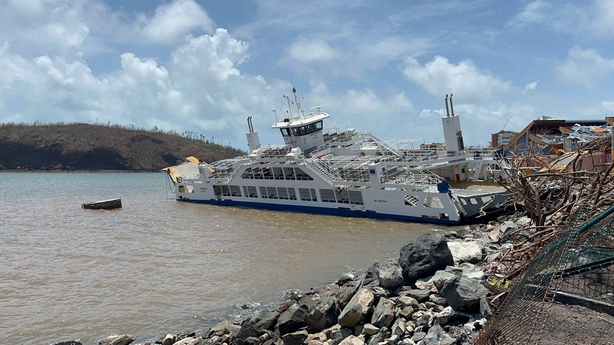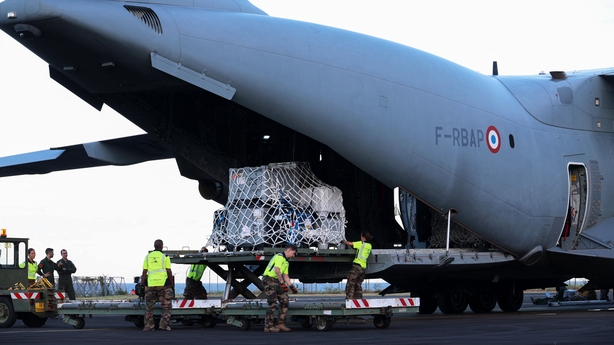The death toll from cyclone Chido's trail of destruction across Mayotte will mount to "definitely several hundred" and "perhaps a few thousand", a local authority in the French Indian Ocean territory has said.
"I think there will be definitely several hundred, perhaps we will come close to a thousand or even several thousand," prefect Francois-Xavier Bieuville said on broadcaster Mayotte la Premiere.
The disaster largely destroyed the shantytowns in which around one-third of the archipelago's population live, as well as cutting off electricity, water and communications links.
Rescue workers and supplies are being rushed in by air and sea, but their efforts are likely to be hindered by damage to airports and electricity distribution in a territory where even clean drinking water was already subject to chronic shortages.
A provisional death toll of 14 was counted in a list compiled by authorities, a security source said.
Nine people were gravely wounded and fighting for their lives in hospital, said Ambdilwahedou Soumaila, mayor of Mayotte's capital Mamoudzou, while 246 more were seriously injured.
"The hospital is hit, the schools are hit. Houses are totally devastated," he said, adding that the hurricane "spared nothing".

Mayotte's 320,000 residents had been ordered into lockdown yesterday as cyclone Chido bore down on the islands around 500 kilometres east of Mozambique with gusts of at least 226 kilometres per hour.
Electricity poles were hurled to the ground, trees uprooted and sheet-metal roofs and walls torn off improvised structures inhabited by at least one-third of the population.
"It will take several days" to establish the full death toll, but "we fear that it is heavy", Interior Minister Bruno Retailleau said late yesterday after a government crisis meeting in Paris.
Information from the locked-down population, in shock and largely cut off from water and electricity supplies, is slow to filter out, a source familiar with the recovery effort said.
One local resident spoke of "apocalyptic scenes" as he made his way through the main island, having to clear blocked roads for himself.
Scramble for supplies
Mr Retailleau will travel to Mayotte tomorrow, his office said, alongside 160 soldiers and firefighters to reinforce the 110 already deployed to the islands.
Medical personnel and equipment were being delivered by air and sea, said the prefecture in La Reunion, another French Indian Ocean territory some 1,400km away on the other side of Madagascar.
A first aid plane landed in Mayotte at around 3.30pm local time (12.30pm Irish time) with three tonnes of medial supplies, blood for transfusions and 17 medical staff, authorities in La Reunion said, with two military aircraft expected to follow.
A navy patrol ship was to depart La Reunion with personnel and equipment including for electricity supplier EDF.

Pope Francis, visiting French Mediterranean island Corsica, urged people to pray for Mayotte residents.
Storm hits Mozambique
Just northwest of Mayotte, the Comoros islands, some of which had been on red alert since Friday, were also hit, but suffered only minor damage.
Cyclone Chido later slammed into Mozambique early this morning, bringing gale-force winds and heavy rain when it made landfall around 40km south of the northern city of Pemba, weather services said.
Buildings were damaged and power knocked out in some areas of Mozambique's northern coastal provinces of Nampula and Cabo Delgado early Saturday, authorities said.
However by the afternoon Chido was travelling over the inland province of Niassa and had weakened, said the president of the National Institute for Risk and Disaster Management, Luisa Meque.
UNICEF said it was on the ground to help the people impacted by the storm, which had already caused some damage.
"Many homes, schools and health facilities have been partially or completely destroyed and we are working closely with government to ensure continuity of essential basic services," it said in a statement.
Cyclone Chido is the latest in a string of storms worldwide to be fuelled by climate change, according to experts.
The "exceptional" cyclone was super-charged by particularly warm Indian Ocean waters, meteorologist Francois Gourand of France's Meteo France weather service told AFP.
The United Nations Office for the Coordination of Humanitarian Affairs said on Friday it was similar in strength to cyclones Gombe in 2022 and Freddy in 2023, which killed more than 60 people and at least 86 in Mozambique respectively.
It warned that some 1.7 million people were in danger, and said the remnants of the cyclone could also dump "significant rainfall" on neighbouring Malawi through tomorrow, potentially triggering flash floods.
Zimbabwe and Zambia were also expected to see heavy rains, it added.


